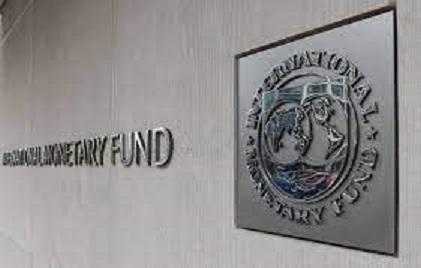Africa-Press – Lesotho. Lesotho’s current government-driven economic model continues to present challenges for growth and private sector development. The outlook points to muted growth of just over 2 percent over the medium term, due to the impact of the war in Ukraine, sluggish regional performance, and longstanding structural issues—including governance and corruption vulnerabilities, limited financial access, and fragile public financial management.
Under current policies, rigidities in public spending—in particular, the public sector wage bill—are weighing on foreign reserves and risk fiscal and debt sustainability.
The government’s prioritization of fiscal consolidation and civil service reform on the back of windfall transfers from the Southern African Customs Union (SACU) is welcome and provides a vital opportunity to alleviate financing pressures.
Alongside this, broad-ranging structural reforms remain essential to strengthen the foundations for green, job-rich, sustainable, and inclusive private sector-led growth. Washington, DC: An International Monetary Fund (IMF) team led by Mr.
Aqib Aslam held meetings in Maseru with the authorities of Lesotho and other counterparts from the public and private sectors and civil society from May 8 to 19, 2023, as part of the 2023 Article IV consultation.
Discussions focused on fiscal and monetary policies to ensure macroeconomic stability and debt sustainability and far-reaching structural reforms needed to create jobs, reduce poverty and inequality, and facilitate the transition to a private-sector-led growth.
Context and outlook The authorities have set out a bold reform agenda, underpinned by a vision of a smaller but more efficient public sector with a high quality of service delivery that provides space for the private sector to grow.
The election outcome—a near Parliamentary majority—provides a vital window of economic and political opportunity. A well-paced and focused sequence of reforms—together with broad capacity development—can help ensure a durable fiscal consolidation, which can rebalance incentives and help shift the economy to a higher growth path.
While the COVID-19 health crisis has largely abated, Lesotho’s structural challenges and capacity constraints have reasserted themselves as severe obstacles to growth:
Large, volatile external transfers and persistent weaknesses in public financial management have fostered high and rigid public expenditure (50 percent of GDP).
This includes one of the largest public sector wage bills in the region, averaging over 15 percent of GDP and 75 percent of tax revenue since FY11/12.
Despite such high public expenditure, the economy has stagnated since 2016 with both real activity and per capita income shrinking by 10 percent—well below the country’s target of 5 percent annual growth to meet national development goals.
The size and reach of the public sector have distorted incentives in the economy. Years of fiscal expansion and the prevalence of public enterprises mean the government is expected to initiate activity and bear the risk of investment.
High credit and setup costs, skills shortages, poor infrastructure, and gaps in legal frameworks also continue to inhibit business development and limit the country’s capacity to attract foreign investment.
This has reduced space for private sector participation such that the economy is largely characterized by low productivity, declining private investment, diminishing competitiveness, and high informality.
As a result, the formal private sector remains small, undiversified, and takes its lead from the government with most micro-, small-, and medium-sized enterprises locked out of financing.
Instead, bank and nonbank lending is largely concentrated in salaried professionals linked to the public sector, which has also driven increasing household indebtedness.
The growth outlook remains subdued and contingent on undertaking fiscal consolidation and structural reforms in tandem, alongside external developments .
The secular decline of key sectors continues to weigh on the economy with growth largely dependent on infrastructure mega-projects and developments in South Africa.
While growth averages 2.1 percent over the medium term, it is expected to decline once phase II of the Lesotho Highlands Water Project has passed its construction peak.
The war in Ukraine raised prices to the benefit of the mining sector but eroded living standards and food security. Inflation is expected to have peaked in FY22/23 and subside gradually over the medium term to just under 5 percent as global food and energy prices ease.
While recent transfers from the Southern African Customs Union (SACU) (over 20 percent of GDP) present an opportunity—if well-managed—to finance fiscal adjustment and alleviate financing constraints, the fiscal outlook is highly sensitive to changes in revenue and expenditure should reform momentum slip, with implications for debt and the external position.
As the public sector recedes, increasing financial access and improving the business environment will be critical. Reforms to address credit constraints, insolvency frameworks, consumer protection, and governance and corruption vulnerabilities are vital to restore investor confidence and create a growth-friendly environment.
Aligning expenditure with available resources Fiscal consolidation remains crucial to reduce imbalances and provide much-needed fiscal space. In the absence of an independent exchange rate policy, fiscal and structural policies must drive external adjustment.
And given the already-high fiscal revenue as a share of GDP—the highest among SACU countries—adjustment will need to be largely expenditure based: Scaling back of less productive expenditure while focusing on more efficient, well-targeted spending, and growth-friendly investment could help revitalize growth.
A combination of short-term containment measures—on wage growth, hiring, and perquisites—and long-term structural reforms would help tackle the large public sector wage bill. Social spending can also be reprioritized to provide space for well-targeted social assistance programs .
For example, reducing costs and improving the targeting of the tertiary education loan bursary scheme by introducing means-testing and pursuing loan recovery would release much-needed funds.
Public investment should finance areas where it will have the maximum growth impact and crowd in private sector investment . While Lesotho’s capital stock is relatively high as a share of GDP, its quality lags that of peers.
Streamlining the budget by identifying and minimizing stalled projects and misclassified current spending—as well as improving accountability, contract design, investment appraisal, and execution—will help ensure that capital spending is more efficient and better targeted to achieve development priorities and maximize growth.
The development, implementation, and commitment to a set of fiscal rules and the development of a fiscal risk management framework will help embed much-needed discipline and build surpluses in good times .
Specifically, the medium-term fiscal framework can be anchored using a debt limit (in present value terms) of 45 percent of GDP to preserve fiscal space and the peg and prevent a sudden deterioration of the debt distress rating.
Domestic revenue mobilization can still help support the adjustment . With volatile external transfers, all available opportunities to broaden the tax base, improve tax administration, and increase compliance must be exploited to help maximize resources and mitigate volatility from SACU transfers.
To this end, it will be vital to maintain the integrity of existing taxes, notably the VAT, strengthen the tax system—including the mining fiscal regime—to guard against international tax avoidance, and develop a reform plan for improved revenue administration in line with the recent tax administration diagnostic assessment (TADAT).
Strengthening public financial management Underpinning fiscal consolidation with robust public financial management would help ensure oversight and accountability and reduce corruption.
Capacity development has helped develop core public financial management functions which are yet to be implemented. Improving budget processes, procurement, and treasury operations in the Ministry of Finance and Development Planning are critical to strengthening fiscal governance.
Robust expenditure control, a transparent and well-coordinated budget process, strong monitoring of state-owned enterprises, and accurate cash management through centralized government accounts would limit spending overruns and arrears and instances of fraud.
Digitalization of government payments can help improve public financial management over the medium term, but any systems must be carefully rolled out across government, ensure interoperability, and be complemented by regular training.
Strengthening monetary policy and financial sector frameworks, and improving policy coordination Tracking policy rate changes by the South African Reserve Bank and maintaining sufficient foreign exchange reserves have safeguarded the exchange rate peg and anchored inflation.
However, the Central Bank of Lesotho should further enhance the monetary policy implementation framework to improve monetary policy transmission and limit reserve volatility induced by banks’ structural excess liquidity. To this end, increasing the range of central bank facilities can improve short-term liquidity management.
With increasing foreign exchange exposure from external loans tied to capital projects, large and volatile financing needs also underscore the importance of developing local currency bonds markets to provide more diverse and stable sources of government funding and support broader financial market deepening.
While progress has been made with bank supervision, greater emphasis should be placed on enhancing oversight of the nonbank financial sector. On banking, the Central Bank of Lesotho (CBL) continues implementation of the Basel ll Capital Adequacy Framework in line with past recommendations.
Nonbank financial supervision—notably of micro-finance institutions, and savings and credit cooperatives (SACCOs)—is still in early stages and must be strengthened to help address troubled institutions and improve supervisory effectiveness, including the development of early intervention and resolution frameworks.
The government must also continue to strengthen AML/CFT supervision: a report from the Eastern and Southern Africa Anti-Money Laundering Group (ESAAMLG) will be released in November 2023, providing guidance on priority actions to address AML/CFT deficiencies.
Coordination between the Ministry of Finance and Development Planning and an independent Central Bank of Lesotho is paramount for macroeconomic stability.
As a small open economy with a large foreign-owned banking sector and a pegged exchange rate, macroeconomic policy objectives should be well-articulated and aligned to ensure that fiscal and exchange rate policies are not in conflict.
Government expenditure and cash management must be consistent with debt sustainability and an adequate level of international reserves to support the peg.
At the operational level, policy coordination and information sharing can be embedded through regular cross-institutional working group meetings. The institutional independence of the central bank must also be preserved through finalization of legislation.
Rebalancing incentives by shifting from a government-centric economy to one with significantly more favorable conditions for diverse private sector-led growth
Broad structural reforms will be needed in tandem with retrenchment of the public sector to support the rebalancing of incentives within the private sector: Providing a stable, predictable, and well-regulated business environment is essential for sustainable private sector-led growth.
Reforms encompass several areas aimed at enhancing financial access and reducing the cost of doing business, including improving the credit infrastructure (including the collateral registry and credit bureau) and the functioning of commercial courts; pushing ahead with legislation to allow for digital verification and payments systems for businesses; reducing the stake of large state-owned enterprises in businesses and utility companies; and boosting private investor confidence through transparent, consistent and clear regulatory frameworks, policy consistency, and a clear long-term strategy for infrastructure development.
With exports reliant on sectors with preferential market access, the need to improve productivity, increase competitiveness, and diversify the export base is clear.
Policies include skills development, infrastructure to enhance connectivity and reduce trade costs, moving up value chains, and removing barriers to entry—such as the costs of setup—to support the emergence of new sectors.
Strengthening the rule of law and promoting good governance can help restore confidence and trust. Plans to establish an independent, well-resourced anti-corruption body, with powers clearly specified in anti-corruption legislation and backed by specialized courts should be completed as soon as possible.
The government can also undertake a governance diagnostic to provide a comprehensive analysis of key corruption vulnerabilities and governance weaknesses, identify reforms to address them, and establish a strategic plan. Lesotho’s vulnerability to climate shocks underscores the importance of building climate-resilient infrastructure.
Investments to improve irrigation systems via a grant from the Millennium Challenge Corporation (over 10 percent of GDP) and reforms to promote climate-smart agricultural practices could help improve productivity and strengthen food security and resilience in agriculture.
For More News And Analysis About Lesotho Follow Africa-Press






